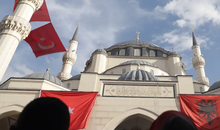
Rama's accusations, Shkodra Prosecution: Here's why criminal proceedings were not initiated for the constructions in Theth
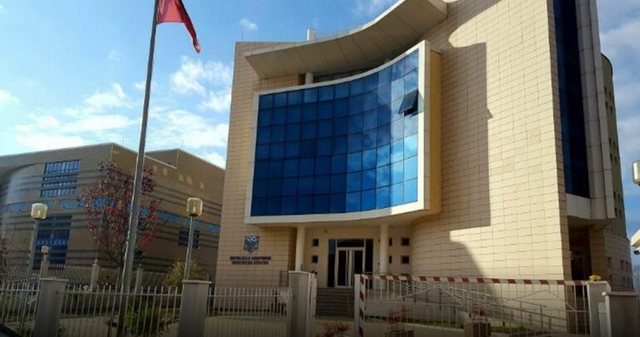
The Prosecutor's Office at the Court of First Instance in Shkodra has reacted after the statements of Prime Minister Edi Rama, who spoke about an unauthorized construction in the Theth area.
The head of government announced that this is a construction in the heart of Theth, in violation of the law, which, although referred to the Prosecutor's Office by the relevant bodies, no action has been taken.
The Prime Minister said he was left speechless by the decision of Prosecutor Elsa Gjeli, who is supposed to protect the country's common assets, and not allow such environmental crimes.
But the Shkodra Prosecutor's Office explains in a statement why no investigation was conducted.
According to the Prosecution, we are not dealing with illegal construction, but with placing containers on top of the slate, as stated in the police report that reported the case.
REACTION OF THE SHKODRA PROSECUTOR'S OFFICE
Based on the public statements made by the Prime Minister of the Republic of Albania, commenting on the decision of a Prosecutor of the Prosecution Office at the Court of First Instance of General Jurisdiction in Shkodra, we clarify public opinion as follows:
The decision of 30.05.2025 of Prosecutor Ms. Elsa Gjeli was taken in full compliance with Article 290, point ç of the Code of Criminal Procedure, which provides that: "Criminal proceedings cannot be initiated when the fact is not provided for by law as a criminal offense or when it is clear that the fact does not exist."
In the specific case, from the full assessment of the facts and procedural acts, it was found that the facts referred to by the state police do not constitute illegal construction within the meaning of Article 199/a of the Criminal Code, for the reason that:
The structures found and referred to by the police were temporary containers without foundations, placed on stone slabs, and as such do not meet the criteria to be considered a construction object according to the standards set out in Law No. 107/2014 "On territorial planning and development", as amended.
The Police themselves, in the report of the inspection of the scene, stated that the containers were not placed on concrete foundations, but were placed on cut stone slabs.
According to Article 7, point 3, letter "i" of the Council of Ministers' Decision No. 408, dated 13.05.2015, as amended, structures that are installed for immediate and/or temporary needs, without foundations and with demountable materials, do not require a building permit, but only a prior declaration.
The IMT itself, the Municipality of Shkodra, in its letter to the Judicial Police, classified the fact as an administrative offense, not a criminal offense, and under these conditions, the institutions responsible for managing the territory should have acted.
Under these conditions, the lack of an objective element and criminal consequence, according to the applied analysis of the law, makes it impossible to initiate criminal prosecution and the Prosecutor, as an independent constitutional body, has the legal obligation to assess the facts in accordance with the law.
In a state governed by the rule of law, the functional independence of the prosecutor is guaranteed by the Constitution and by Law No. 97/2016 “On the Organization and Functioning of the Prosecution in the Republic of Albania”. The Prosecution is an independent constitutional institution that operates in accordance with the law, where every procedural decision is taken on the basis of the facts and evidence administered, and outside of any external political influence. Any attempt to directly or indirectly influence the decision-making of a prosecutor violates the principle of separation of powers enshrined in Article 7 of the Constitution.
Respect for the separation of powers is the foundation of the functioning of a democratic state and the interference of the executive branch in the decision-making processes of justice institutions, whether through public comments, can be perceived as pressure on justice institutions and damage citizens' trust in these institutions.
The decision not to initiate criminal proceedings is not an act of personal will, but a legal act, based on the fundamental rules of substantive and procedural criminal law. Any institutional concerns must be addressed through established legal channels, and not through public political messages aimed at imposing themselves on the justice system. The rule of law cannot function if the prosecutor is afraid of any lawful decision-making that may not coincide with the interests of other powers.
Latest news




Marrëdhënia që s’është romancë, por s’është as thjesht kolegiale
2025-07-07 21:39:13
Citizen is asked to pay 2.5 million for a non-existent meter
2025-07-07 21:28:03

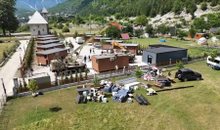


What is the ideal air conditioner temperature in summer?
2025-07-07 20:53:46
GJKKO left him in prison, Meta appeals the decision
2025-07-07 20:38:05
Where is Ronaldo after missing Diogo Jota's funeral?
2025-07-07 20:38:04

Messages from the author who killed Ilaria Sulla in Rome are revealed
2025-07-07 20:20:12
At least 91 dead in Texas floods
2025-07-07 20:12:02
Elbasan, choked by smoke, scorched by conscience
2025-07-07 19:48:16

Swarm of bees attacks citizens in France, 24 people end up in hospital
2025-07-07 19:32:03
Dementia/Hearing loss may be a warning sign
2025-07-07 19:13:06
The decision for Malltez, Gjokutaj: Boomerang for SPAK and the Court
2025-07-07 19:01:08

Former Supreme Court member acquitted of asset concealment
2025-07-07 18:36:40

WIIW expert in Politiko: Brain drain is steadily weakening the Albanian economy
2025-07-07 18:11:41
Heart health is at risk from extreme heat, here's what you should be careful of
2025-07-07 18:10:18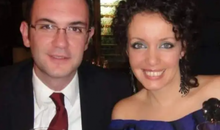
Today Gert Bogdani would celebrate, Edlira Çepani's touching dedication
2025-07-07 17:40:45
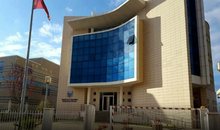
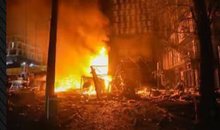

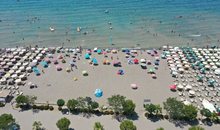


The striker severely accuses the Fenerbahce club: They tried to drug me
2025-07-07 16:21:03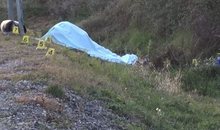
A decomposed body is found in Kolonjë, initial suspicions
2025-07-07 16:03:31
Accident in Saranda, car hits motorcycle, one injured
2025-07-07 15:58:56

The most fertile age for men and women
2025-07-07 15:40:52
Locals, Rama candidate in 5 municipalities
2025-07-07 15:32:22
Blushi: Meta's criminal kidnapping, incomparable even to Navalny's in Russia
2025-07-07 15:20:34
Meet the iPhone 17 Pro, the main innovations in design and technology
2025-07-07 15:09:09
Why the release of Abi Malltez does not free him; much less Albania
2025-07-07 15:00:12
‘Lidhjet klienteliste’ të mjekëve mbushin recetat e pacientëve
2025-07-07 14:57:33
Poland imposes border controls with Germany and Lithuania
2025-07-07 14:48:15

Caught transporting firearms from Kosovo to Albania, young man arrested (NAME)
2025-07-07 14:37:47
Theo Hernandez flies to Saudi Arabia for medical check-ups
2025-07-07 14:26:47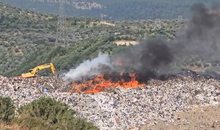


Scorching heat, Greece orders mandatory work holidays
2025-07-07 13:54:25


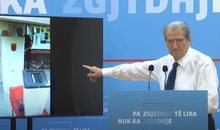

Trump expects Netanyahu to discuss Gaza ceasefire
2025-07-07 12:54:27
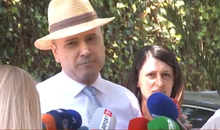
GJKKO releases Jamarbër Malltezi from house arrest
2025-07-07 12:35:02
Tourism among contrasts
2025-07-07 12:31:01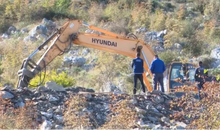
IKMT action in Theth, starts demolition of unauthorized constructions
2025-07-07 12:24:18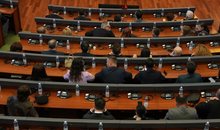

The Tirana-Kamëz line is destroyed by urban fire
2025-07-07 12:00:24




Poor direction!
2025-07-07 11:16:01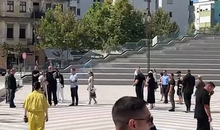


Rama to gather the country's mayors on July 9
2025-07-07 10:43:31
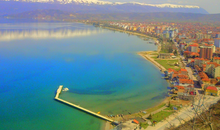
Ohrid Natural Park on the way to UNESCO's "black list"
2025-07-07 10:25:58

Registrations for the new school year begin in e-Albania
2025-07-07 09:59:09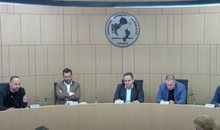
KAS decides the "fate" of the elections in four districts of the country today
2025-07-07 09:50:51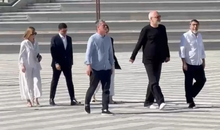
Rama does not give up on Vlora, visits the municipality again
2025-07-07 09:39:11
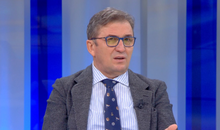
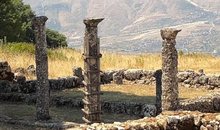
Fires in Gjirokastra, flames very close to cultural monuments
2025-07-07 09:12:49

Foreign exchange, the rate at which foreign currencies are sold and bought
2025-07-07 08:39:57

Horoscope, what do the stars have in store for you today?
2025-07-07 08:14:17
The week starts with scorching temperatures, the thermometer reaches 37°C
2025-07-07 07:58:36
Morning Post/ In 2 lines: What mattered yesterday in Albania
2025-07-07 07:45:15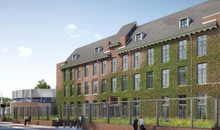



Theologian: Behind Rama's idea for a Bektashi state in Albania, Israel is hiding
2025-07-06 20:57:48
Rama's rhetoric without standards, comparing Paris, London, New York with Vlora
2025-07-06 20:35:52
Vehicle goes off the road, driver dies in Kukës
2025-07-06 20:07:47
What is the possible agreement on the Gaza hostages and the ceasefire?
2025-07-06 19:47:09

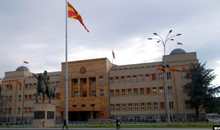
Massive hiring in the Macedonian administration ahead of the elections
2025-07-06 18:37:19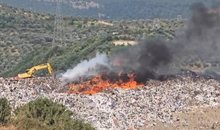
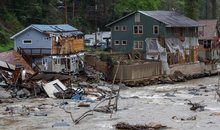
Texas tragedy: 59 dead and 27 girls still missing after devastating floods
2025-07-06 17:48:24
Albania for sale and purchase by Jared Kushner
2025-07-06 17:17:37
Kurti reacts to bomb threat in Parliament: Active hybrid war from Serbia
2025-07-06 16:55:59

After clashing with Trump, Musk says he's forming a new political party
2025-07-06 16:14:27